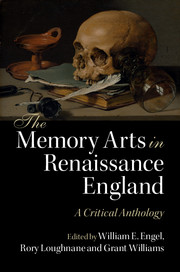Book contents
- Frontmatter
- Dedication
- Contents
- List of figures
- Acknowledgements
- A note on abbreviations
- Introduction
- PART I The art of memory
- PART II Rhetoric and poetics
- PART III Education and science
- PART IV History and philosophy
- Introduction to Part IV
- IV.1 Lodowick Lloyd, The Pilgrimage of Princes (1573)
- IV.2 William Camden, Remains Concerning Britain (1605)
- IV.3 Francis Bacon, The Advancement of Learning (1605)
- IV.4 Pierre Charron, Of Wisdom (1608)
- IV.5 John Weever, Ancient Funeral Monuments (1631)
- IV.6 Edward Reynolds, A Treatise of the Passions and Faculties (1640)
- IV.7 Thomas Fuller, selected works
- IV.8 Kenelm Digby, Two Treatises (1644)
- IV.9 Thomas Hobbes, Leviathan (1651)
- IV.10 William Dugdale, Baronage of England (1675–1676)
- PART V Religion and devotion
- PART VI Literature
- Index
- References
IV.2 - William Camden, Remains Concerning Britain (1605)
from PART IV - History and philosophy
Published online by Cambridge University Press: 05 August 2016
- Frontmatter
- Dedication
- Contents
- List of figures
- Acknowledgements
- A note on abbreviations
- Introduction
- PART I The art of memory
- PART II Rhetoric and poetics
- PART III Education and science
- PART IV History and philosophy
- Introduction to Part IV
- IV.1 Lodowick Lloyd, The Pilgrimage of Princes (1573)
- IV.2 William Camden, Remains Concerning Britain (1605)
- IV.3 Francis Bacon, The Advancement of Learning (1605)
- IV.4 Pierre Charron, Of Wisdom (1608)
- IV.5 John Weever, Ancient Funeral Monuments (1631)
- IV.6 Edward Reynolds, A Treatise of the Passions and Faculties (1640)
- IV.7 Thomas Fuller, selected works
- IV.8 Kenelm Digby, Two Treatises (1644)
- IV.9 Thomas Hobbes, Leviathan (1651)
- IV.10 William Dugdale, Baronage of England (1675–1676)
- PART V Religion and devotion
- PART VI Literature
- Index
- References
Summary
About the author
William Camden (1551–1623) wrote the first chorographical study of Britain ‘to restore antiquity to Britain, and Britain to its antiquity’, which formed the basis of Remains (1605) and, following five revised and increased editions, was translated into English by Philemon Holland (1610).
About the text
Unlike Britannia, written in Latin to appeal to continental readers, Remains (begun 1583 and completed 1597) was designed for an English audience. Camden gathered information not only from books and manuscripts (over 350 are cited), but also visitations throughout the realm as Clarenceux King of Arms. Concerning the excerpts presented here, the one on rebuses was not included in Britannia, and the one on imprese grew out of his affiliation with the Society of Antiquaries of which he was a founding member. He reminds readers that his work is not an exhaustive study of any one subject; and, although not above reshaping a story, never departs substantially from his source material such that his compendium, deliberately written in a straightforward plain style, became a touchstone for contemporary taste and an authoritative epitome of cultural history.
The arts of memory
Remains is a monumental effort, using the commonplace book approach, to recover and consolidate England's national character through long lists and discussions of names, rebuses, anagrams, coats of arms, coins, imprese, apparel, artillery, wise speeches, proverbs, poems, epigrams, rhythms (rhyming verses) and epitaphs. Camden recorded for posterity these disparate traces of England's heritage found in material artefacts as well as ephemera. His assemblage of things left out of Britannia, self-effacingly referred to as ‘rude rubble and out-cast rubbish’ (A3v), stabilised for future generations a cultural memory built out of all manner of remains salvaged from oblivion. The excerpts here concern associative memory as a method for generating relevant and retrievable markers of cultural history, and reflect Camden's appreciation of the commemorative function of words and images to forge lasting impressions not just for individuals and groups, but an entire nation.
Textual notes
Remaines of a greater worke, concerning Britaine (London, 1605), v1v–v2v, x3v.
- Type
- Chapter
- Information
- The Memory Arts in Renaissance EnglandA Critical Anthology, pp. 194 - 197Publisher: Cambridge University PressPrint publication year: 2016
References
- 1
- Cited by



